(完整版)新译林版英语四年级下册Unit5知识点归纳
- 格式:pdf
- 大小:107.59 KB
- 文档页数:2
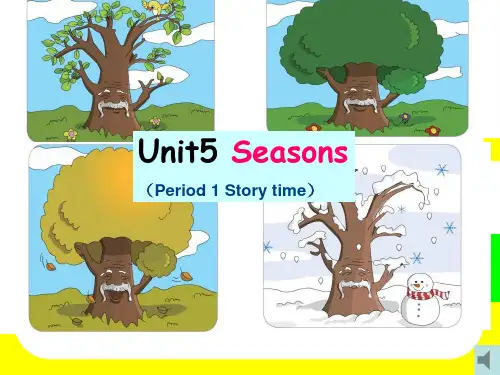
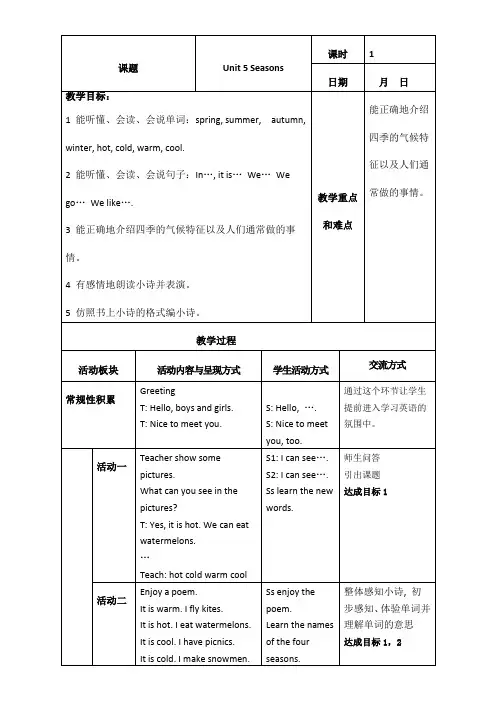
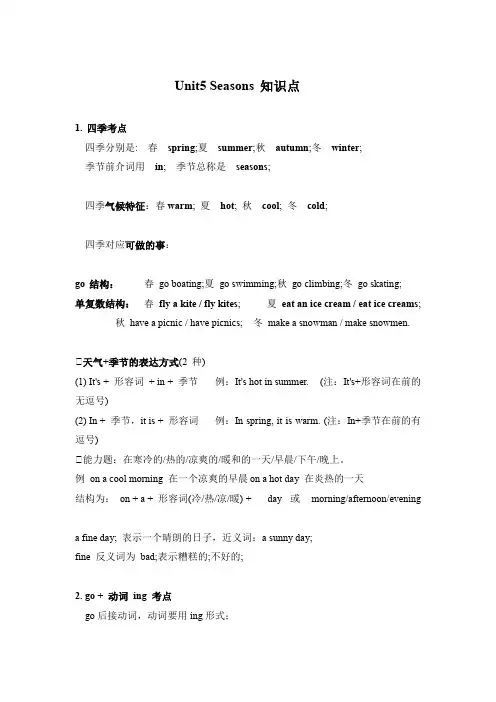
Unit5 Seasons 知识点1. 四季考点四季分别是:春spring;夏summer;秋autumn;冬winter ;季节前介词用in ;季节总称是seasons;四季气候特征:春warm; 夏hot; 秋cool; 冬cold;四季对应可做的事:go 结构:春go boating;夏go swimming;秋go climbing;冬go skating;单复数结构:春fly a kite / fly kites;夏eat an ice cream / eat ice creams;秋have a picnic / have picnics; 冬make a snowman / make snowmen.④天气+季节的表达方式(2 种)(1) It's + 形容词+ in + 季节例:It's hot in summer.(注:It's+形容词在前的无逗号)(2) In + 季节,it is + 形容词例:In spring, it is warm. (注:In+季节在前的有逗号)④能力题:在寒冷的/热的/凉爽的/暖和的一天/早晨/下午/晚上。
例on a cool morning 在一个凉爽的早晨on a hot day 在炎热的一天结构为:on + a + 形容词(冷/热/凉/暖) +day 或morning/afternoon/eveninga fine day; 表示一个晴朗的日子,近义词:a sunny day;fine 反义词为bad;表示糟糕的;不好的;2. go + 动词ing 考点go后接动词,动词要用ing形式;动词ing形式的变化规则:(1)一般动词直接加ing; 例:go boating; go climbing;(2)结尾不发音的e去掉加ing; 例:go skating;(3)如遇辅元辅,双写末尾字母加ing; 例:go swimming;go running3. Here + is/are 考点Here’s your chair.Here’s +名词单数你的椅子在这儿。
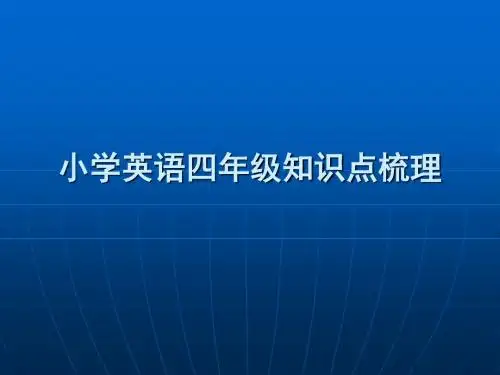
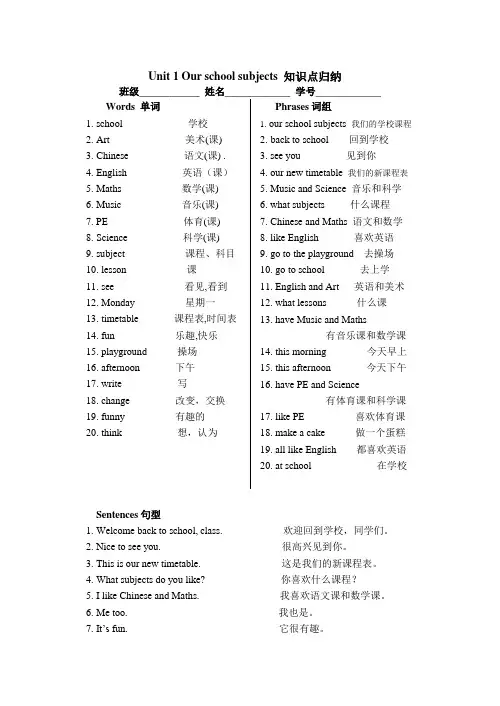
Unit 1 Our school subjects 知识点归纳班级____________ 姓名_____________ 学号_____________Words 单词1. school 学校2. Art 美术(课)3. Chinese 语文(课) .4. English 英语(课)5. Maths 数学(课)6. Music 音乐(课)7. PE 体育(课)8. Science 科学(课)9. subject 课程、科目10. lesson 课11. see 看见,看到12. Monday 星期一13. timetable 课程表,时间表14. fun 乐趣,快乐15. playground 操场16. afternoon 下午17. write 写18. change 改变,交换19. funny 有趣的20. think 想,认为Phrases词组1.our school subjects 我们的学校课程2.back to school 回到学校3. see you 见到你4. our new timetable 我们的新课程表5. Music and Science 音乐和科学6. what subjects 什么课程7. Chinese and Maths 语文和数学8. like English 喜欢英语9. go to the playground 去操场10. go to school 去上学11. English and Art 英语和美术12. what lessons 什么课13. have Music and Maths有音乐课和数学课14. this morning 今天早上15. this afternoon 今天下午16. have PE and Science有体育课和科学课17. like PE 喜欢体育课18. make a cake 做一个蛋糕19. all like English 都喜欢英语20. at school 在学校Sentences句型1. Welcome back to school, class. 欢迎回到学校,同学们。
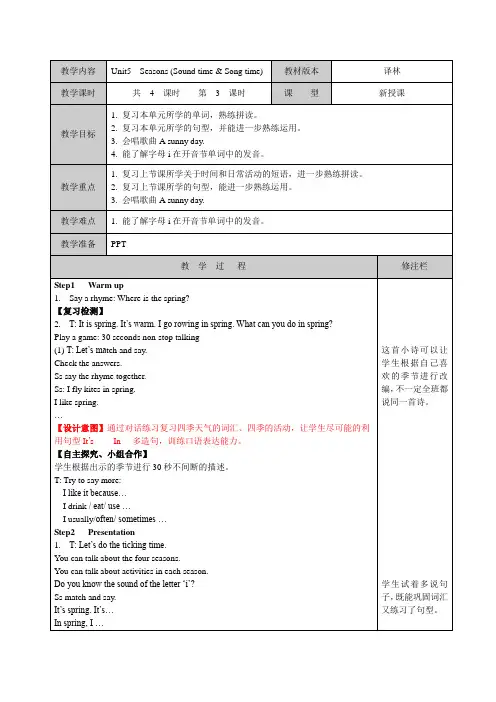
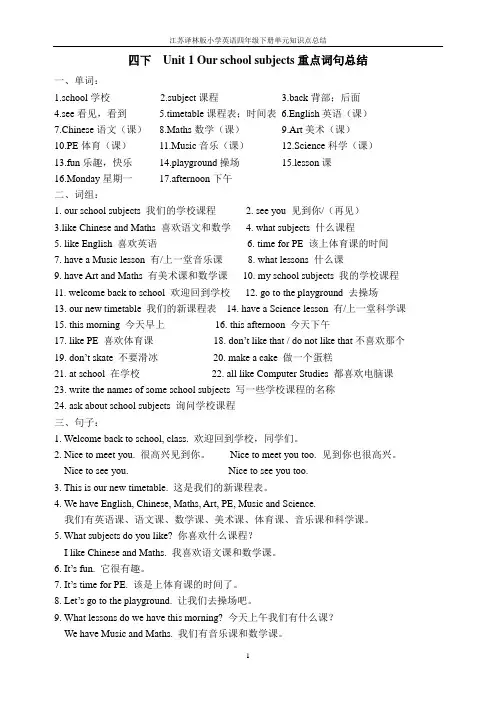
四下Unit 1 Our school subjects重点词句总结一、单词:1.school学校2.subject课程3.back背部;后面4.see看见,看到5.timetable课程表;时间表6.English英语(课)7.Chinese语文(课)8.Maths数学(课) 9.Art美术(课)10.PE体育(课) 11.Music音乐(课)12.Science科学(课)13.fun乐趣,快乐 14.playground操场15.lesson课16.Monday星期一17.afternoon下午二、词组:1. our school subjects 我们的学校课程2. see you 见到你/(再见)3.like Chinese and Maths 喜欢语文和数学4. what subjects 什么课程5. like English 喜欢英语6. time for PE 该上体育课的时间7. have a Music lesson 有/上一堂音乐课8. what lessons 什么课9. have Art and Maths 有美术课和数学课10. my school subjects 我的学校课程11. welcome back to school 欢迎回到学校12. go to the playground 去操场13. our new timetable 我们的新课程表14. have a Science lesson 有/上一堂科学课15. this morning 今天早上16. this afternoon 今天下午17. like PE 喜欢体育课18. don’t like that / do not like that不喜欢那个19. don’t skate 不要滑冰20. make a cake 做一个蛋糕21. at school 在学校 22. all like Computer Studies 都喜欢电脑课23. write the names of some school subjects 写一些学校课程的名称24. ask about school subjects 询问学校课程三、句子:1. Welcome back to school, class. 欢迎回到学校,同学们。
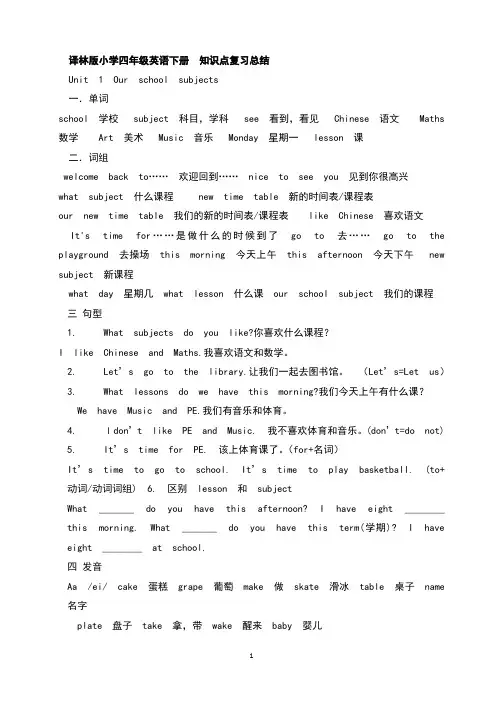
译林版小学四年级英语下册知识点复习总结Unit 1 Our school subjects一.单词school 学校 subject 科目,学科see 看到,看见Chinese 语文Maths 数学 Art 美术Music 音乐 Monday 星期一 lesson 课二.词组welcome back to……欢迎回到……nice to see you 见到你很高兴what subject 什么课程 new time table 新的时间表/课程表our new time table 我们的新的时间表/课程表 like Chinese 喜欢语文It's time for……是做什么的时候到了go to去……go to the playground 去操场this morning 今天上午this afternoon 今天下午 new subject 新课程what day 星期几what lesson 什么课our school subject 我们的课程三句型1.What subjects do you like?你喜欢什么课程?I like Chinese and Maths.我喜欢语文和数学。
2.Let’s go to the library.让我们一起去图书馆。
(Let’s=Let us)3.What lessons do we have this morning?我们今天上午有什么课?We have Music and PE.我们有音乐和体育。
4.Idon’t like PE and Music. 我不喜欢体育和音乐。
(don’t=do not)5.It’s time for PE. 该上体育课了。
(for+名词)It’s time to go to school. It’s time to play basketball. (to+动词/动词词组) 6. 区别lesson 和subjectWhat _______ do you have this afternoon? I have eight ________ this morning. What _______ do you have this term(学期)? I have eight ________ at school.四发音Aa /ei/ cake 蛋糕grape 葡萄make 做skate 滑冰table 桌子name 名字plate 盘子take 拿,带wake 醒来baby 婴儿五练习(一)、单项选择。
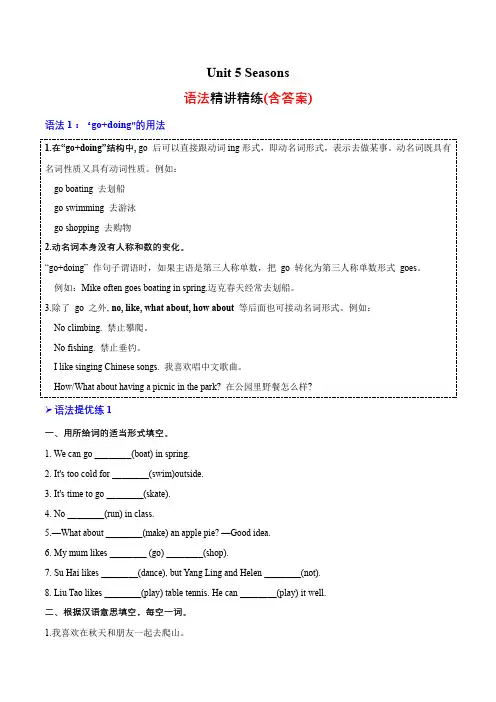
Unit 5 Seasons语法精讲精练(含答案)语法1:“go+doing”的用法1.在“go+doing”结构中, go 后可以直接跟动词ing形式,即动名词形式,表示去做某事。
动名词既具有名词性质又具有动词性质。
例如:go boating 去划船go swimming 去游泳go shopping 去购物2.动名词本身没有人称和数的变化。
“go+doing” 作句子谓语时,如果主语是第三人称单数,把go 转化为第三人称单数形式goes。
例如:Mike often goes boating in spring.迈克春天经常去划船。
3.除了go 之外, no, like, what about, how about 等后面也可接动名词形式。
例如:No climbing. 禁止攀爬。
No fishing. 禁止垂钓。
I like singing Chinese songs. 我喜欢唱中文歌曲。
How/What about having a picnic in the park? 在公园里野餐怎么样?➢语法提优练1一、用所给词的适当形式填空。
1. We can go ________(boat) in spring.2. It's too cold for ________(swim)outside.3. It's time to go ________(skate).4. No ________(run) in class.5.—What about ________(make) an apple pie? —Good idea.6. My mum likes ________ (go) ________(shop).7. Su Hai likes ________(dance), but Yang Ling and Helen ________(not).8. Liu Tao likes ________(play) table tennis. He can ________(play) it well.二、根据汉语意思填空,每空一词。
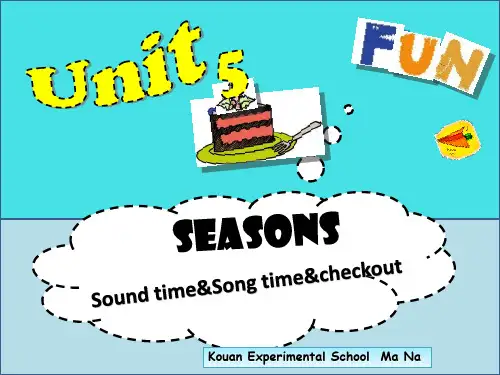
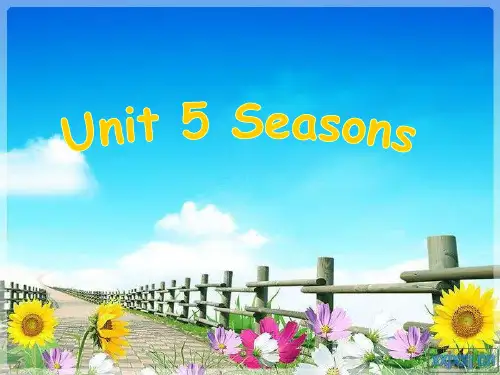
四年级英语下册知识点梳理Unit1 Our school subjects一、重点词组:1. our new timetable 我们的新课表2. an Art lesson 一节美术课3. like Chinese / Maths /English 喜欢语文/数学/英语4. what subjects 什么课程(科目)5. go to the playground 去操场6. what lessons 什么课7. this morning /afternoon /evening 今天早上/下午/晚上8. at school 在学校二、重点句型:1. Welcome back to school. 欢迎回到学校。
2. Nice to see you. 见到你很高兴。
3. It’s time for PE. 该上体育课了。
4. What subjects do you like? 你喜欢什么科目?5. I like Art and Music. 我喜欢美术和音乐三、重点语言知识1. 课程类单词首字母都要大写,如:A rt,C hinese,E nglish等。
2. Welcome back to school. 欢迎回到学校。
Welcome to our school. 欢迎来到我们的学校。
3. Nice to meet you. 用于陌生人首次见面打招呼用语。
Nice to see you. 用于熟人之间好久不见再次见面时打招呼用语。
4. 询问别人意见时可以说:What about you? 和How about you?的用法相近,可以替换使用。
5. 到时间该做某事;It’s time for + 名词;It’s time to + 动词。
例如:It’s time for school. =It’s time to go to school.到时间该上学了。
6. subject 表示“学科,科目”。
译林版四年级英语下册Unit1-8全册知识点汇总译林版四年级英语下册Unit1知识点汇总词汇分类课程:Chinese语文(课)Maths数学(课)Art美术(课)PE体育(课)Music音乐(课)Science/科学(课)地点:school 学校playground 操场时间:Monday 星期一afternoon下午其他:see 看见,看到fun 乐趣,快乐subject 课程lesson 课timetable 课程表;时间表句型表达欢迎回到某地的句型:Welcome back to school.Welcome back home.询问对方喜欢什么课程的句型及其答语:What subjects do you like?I/We like Chinese.I/We like Maths.短语go to 去…welcome back to…欢迎回到…our new timetable 我们的新课程表惯用表达式①nice to see you.见到你很高兴。
②What about you?你(们)呢?知识点精析1.表达欢迎回到某地的句型——Welcome back (to)…【课文应用】Welcome back to school, class. 欢迎回到学校,同学们。
【句型结构】Welcome back (to)+地点( school, home,here...)【重点解析】welcome在这里是感叹词,表示“欢迎”to后接表示地点的名词,如果“地点”是副词,to要省略。
【生活实例】看看Lingling是怎样迎接从国外参加比赛回来的同学们的: Langling: Welcome back to China!欢迎回到中国!2.如何表达见到某人很高兴【课文应用】Nice to see you, Miss Li. 见到你很高兴,李老师。
Nice to see you too. 见到你们也很高兴。
“Nice to see you”意为“见到你(们)很高兴”,它的答语可以为“Nice to see you too.例如:一Nice to see you here,Miss Zhao. 在这里见到你很高兴,赵老师。
Review & Check Unit5 Seasons
Unit5课文重点内容详解:
一年(year)有四个季节(four seasons).【There’re four seasons in a year.】四个季节
分别是:
spring 春天 summer 夏天 autumn/ fall 秋天 winter 冬天
1. It’s spring. It’s warm.We fly kites. We go boating. We like spring.
1) warm adj. 温暖的
拓展:hot 热的 cold 冷的 cool / ku:l /凉爽的
2) fly kites放风筝,fly是“放飞”的意思。
3) go boating = go rowing 去划船。
类似的结构还有:go running/ jogging/ shopping/ swimming ... 去跑步/ 慢跑/ 逛
街/ 游泳 ……
2. In summer, it’s hot. We eat ice creams. We go swimming. We like summer.
1) in + 季节名称,如:in spring/ summer/ autumn/ winter
2) 一个冰激凌 an ice cream(或 an ice-cream)
拓展:ice是“冰”的意思,cream是“奶油”的意思。
3. In autumn, it’s cool. We have picnics. We go climbing. We like autumn.
1) have picnics 野餐
2) go climbing 去爬山,climb是“攀登、攀爬”的意思
4. In winter, it’s cold. We make snowmen. We go skating. We like winter.
1) make snowmen 堆雪人,snowmen是snowman的复数。
拓展:snow + man = snowman;snow + ball = snowball 雪球
打雪仗 have snowball fights
2) go skating 去滑冰,skate 是“滑冰,溜冰”的意思。
拓展:ski滑雪,go skiing去滑雪。
5. —Mum, it’s a fine day today! 妈妈,今天是一个好天!(今天天气真不错!
)
—Yes, it is. 是的。
1) fine是“(天气)好的”的意思。
拓展:(1) 表示“天气坏的”,我们用“bad”来形容。
(2) 感叹句:今天天气多好呀!
What fine weather ( it is)! = What a fine day (it is)!
= How fine the weather is! = How fine the day is!
6. It’s very cold. Here’s your jacket.
1) Here’s your jacket. 多用于口语中,表示“(穿上)你的夹克衫。”
拓展:clothes衣服(总称);coat 大衣、外套;sweater毛衣;shirt衬衫;blouse
女士衬衫;T-shirt T恤;skirt短裙;dress连衣裙;trousers裤子、长裤;shorts/
pants短裤;socks袜子;shoes鞋子;gloves手套;scarf围巾 ……
7. —Whose bag is this? 这是谁的包?
—It’s my bag. 这是我的包。
1) 特殊疑问词“whose”,意思是“谁的”,既可以相当于“形容词性物主代词”
的用法,也可以相当于“名词性物主代词”的用法,也就是在“whose”后既可
以加上某物(sth.),也可以不加,“whose”单独使用。
eg.: Whose schoolbag is this? = Whose is this schoolbag?
Whose boxes are these? = Whose are these boxes?
2) 注意回答。如果问的是单数,答句的主语和谓语要用“It’s”;如果问的是复
数,答句的主语和谓语要用“They’re”。
拓展:试比较同音字“whose”和“who’s”。
8. Let’s fly kites. 让我们放风筝吧。
9. I can talk about activities in each season. 我能谈论每个季节里的活动。
1) talk about 谈论
2) activity活动,复数:activities
3) each每一个,强调“单个、各个”
拓展:试比较近义词“each”和“every”。